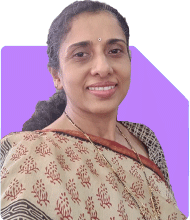
My wife and I are around 34 years old. Both are working in IT earning around 2.60l p.m. We have 2 kids(boys), one is studying 2nd class and the other one is 6 months old. Below are our expenditure and savings: Term insurance- 57k p.a for 6 years Life insurance -18k p.a for 6 yrs Own house(brought an independent house at 51l, now it costs - 1cr)-15l Home loan for next 3 years -47k p.m School and transportation fee for the elder boy -1.10l p.a Planning to send day care for a younger boy -20k p.m Monthly expenses -45k p.m Bought 3 plots at 40l(2 to 5 years back for incase any future needs) now costs 50l Our pf bal- around 23l till now Stocks- 7l(invested around 5l in 1 year , profit at 2l) Gold jewellery -220 grams Cash on hand 30l No additional medical insurance apart from the company provided (8l p.a) My wife is planning to work for the next 5 yrs, I will work for 10yrs(these are rough figures as we are working in IT). Need advice on following main things and also please provide suggestions on other things as well, how can we save and invest to get high returns so that we can secure our future financially: 1. Schooling and higher studies for 2 boys(Short and long term education plan for kids. With drawl based on the need in the emergency and pay, please suggest which scheme/plan suits for this). 2. Retirement plan(how can we plan, thinking to utilize here pf amount, suggest any other things as well). 3. Emergency Fund creation plan(where can we invest and withdraw if immediately required). 4. Medical health insurance after retirement(currently a company providing 16l from both of us, how can we plan for future medical emergencies for family). As we have coh 30l, is it worthy to take independent house g+1 -1.4cr (1.1 house loan with we can show tax benefit for both of us in future, 25k p.m rental income, thinking in such a way that it's useful for kids studies, later it may help as pension after retirement. Also in the future land prices may increase high.) or invest somewhere else to get high returns and withdrawal periodically based on our needs. Please provide your valuable suggestions on above 4 points and investment of coh 30l which gives us high returns. It helps us to organise things in a better way for our future. Thank you in advance.
Ans: You and your wife, both aged 34, are in a solid financial position, each earning Rs. 1.30 lakhs per month in the IT sector. You have two young children, one in 2nd class and the other just 6 months old. Your family’s financial situation involves various assets and liabilities, including real estate, stocks, gold, and insurance policies. You’ve taken significant steps to secure your future, but with some strategic guidance, you can optimise your financial planning further.
Financial Analysis
Income and Expenses
Monthly Income: Rs. 2.60 lakhs (combined)
Monthly Expenses: Rs. 45,000
Home Loan EMI: Rs. 47,000
Daycare Fees: Rs. 20,000
School Fees: Rs. 1.10 lakhs annually (approx. Rs. 9,167 monthly)
Assets
Term Insurance: Rs. 57,000 per annum
Life Insurance: Rs. 18,000 per annum
Home Value: Rs. 1 crore (current)
Plots Value: Rs. 50 lakhs
PF Balance: Rs. 23 lakhs
Stocks: Rs. 7 lakhs (profit Rs. 2 lakhs)
Gold: 220 grams
Cash on Hand: Rs. 30 lakhs
Liabilities
Home Loan Balance: Rs. 15 lakhs (3 years remaining)
Key Financial Goals
Children’s Education
Retirement Planning
Emergency Fund Creation
Medical Insurance Post-Retirement
Detailed Financial Planning
Children’s Education
Short-Term Education Plan
Your elder son’s school fees and upcoming daycare expenses for your younger son necessitate a dedicated fund. You can utilise short-term debt funds or fixed deposits for this purpose. These are low-risk options that ensure the money is available when needed without much volatility.
Debt Funds: These are mutual funds that invest in fixed income securities like bonds and treasury bills. They provide better returns than savings accounts and fixed deposits while maintaining low risk.
Fixed Deposits: These are safer but typically offer lower returns compared to debt funds. They are good for very short-term needs.
Long-Term Education Plan
For higher education, investing in equity mutual funds is advisable. Equity mutual funds offer high returns over a long period, making them suitable for goals that are 10-15 years away. Starting a Systematic Investment Plan (SIP) in these funds can help in averaging the cost of investment and compounding over time.
Equity Mutual Funds: These funds invest in stocks and aim for high growth. While they are riskier, they also offer the potential for higher returns over the long term.
SIP: A Systematic Investment Plan allows you to invest a fixed amount regularly in mutual funds. It helps in averaging out the purchase cost and harnessing the power of compounding.
Recommended Strategy
Short-Term: Invest in debt funds or fixed deposits for immediate schooling needs.
Long-Term: Start SIPs in equity mutual funds for higher education goals.
Retirement Planning
Utilise PF Wisely
Your Provident Fund (PF) balance is a significant asset. Continue contributing to your PF, as it’s a safe and tax-efficient way to build your retirement corpus. The power of compounding will help grow this amount substantially by the time you retire.
Diversified Investment Portfolio
In addition to PF, consider diversifying into equity mutual funds for better growth. These funds provide higher returns compared to traditional savings schemes. Adding some balanced or hybrid funds can help mitigate risks while still aiming for growth.
Retirement Corpus Calculation
Estimate your retirement corpus considering your desired retirement age, lifestyle, and inflation. Use this to set a monthly investment target. Regularly review your investments and adjust your SIP amounts to ensure you stay on track to meet your retirement goals.
Balanced/Hybrid Funds: These funds invest in a mix of equity and debt. They are less risky than pure equity funds but offer better returns than debt funds.
Regular Review: Periodically assess your investments and adjust based on performance and changing financial goals.
Recommended Strategy
EPF/PPF: Continue contributions to your Employee Provident Fund (EPF) and consider opening a Public Provident Fund (PPF) for additional tax-saving benefits.
Mutual Funds: Invest in equity and balanced mutual funds via SIP.
Emergency Fund Creation
Importance of Emergency Fund
An emergency fund is essential for unexpected expenses like medical emergencies, job loss, or urgent home repairs. Aim to save 6-12 months of expenses.
Investment Options
Keep your emergency fund in liquid funds or a high-interest savings account. These options offer easy access and reasonable returns.
Steps to Build
Start by setting aside a fixed amount every month. Automate this transfer to ensure consistency. Use part of your current cash on hand (Rs. 30 lakhs) to create this fund.
Liquid Funds: These mutual funds invest in very short-term instruments and provide liquidity with better returns than savings accounts.
High-Interest Savings Accounts: Offer immediate access and higher interest rates compared to regular savings accounts.
Recommended Strategy
Target Amount: Save 6-12 months of living expenses in liquid and easily accessible funds.
Investment Options: Use liquid funds and high-interest savings accounts.
Medical Health Insurance Post-Retirement
Assess Current Coverage
You currently have Rs. 16 lakhs coverage from your employers. This is good, but consider additional personal health insurance for comprehensive coverage. This ensures you’re protected even after retirement.
Long-Term Health Insurance
Look for family floater health plans that cover you, your wife, and your children. Choose a plan with lifetime renewability and adequate sum insured. Also, consider critical illness insurance for added protection.
Family Floater Plans: These plans cover all family members under a single policy. Ensure it offers sufficient coverage for all members.
Critical Illness Insurance: Provides a lump sum payout if diagnosed with specified serious illnesses. This can help cover costs not covered by regular health insurance.
Recommended Strategy
Personal Health Insurance: Opt for a family floater plan with lifetime renewability and a higher sum insured.
Critical Illness Insurance: Consider adding this for extra coverage against serious illnesses.
Investing Rs. 30 Lakhs Cash on Hand
Avoid Real Estate Investment
Instead of buying another house, which ties up funds and incurs maintenance costs, invest in financial instruments that offer liquidity and growth. Real estate investment, while potentially profitable, lacks the flexibility and liquidity you might need.
Investment Options
Equity Mutual Funds: For long-term growth. Allocate a significant portion to these funds. They offer higher returns and can be withdrawn partially when needed.
Debt Funds: For stability and moderate returns. Good for medium-term goals and partial withdrawals.
Hybrid Funds: Balance between equity and debt. Lower risk compared to pure equity funds but higher returns than debt funds.
Systematic Withdrawal Plans (SWP): Invest lump sum in mutual funds and withdraw a fixed amount regularly. Useful for supplementing income post-retirement.
Equity Mutual Funds
Long-Term Wealth Building: These funds are ideal for creating long-term wealth. Investing Rs. 30 lakhs here can yield significant returns over 10-15 years.
Partial Withdrawals: You can withdraw money partially when needed, providing flexibility.
Debt Funds
Stability and Returns: They offer more stability and are suitable for medium-term goals.
Safety: Less volatile than equity funds, making them a safer option for conservative investors.
Hybrid Funds
Balanced Growth: These funds offer a mix of safety and growth, making them suitable for medium to long-term investments.
Risk Mitigation: Less risky than pure equity funds, they provide a balanced approach to investing.
Systematic Withdrawal Plans (SWP)
Regular Income: Invest a lump sum in mutual funds and withdraw a fixed amount regularly.
Post-Retirement: SWPs can provide a regular income stream, supplementing your retirement corpus.
Recommended Strategy
Equity Mutual Funds: Invest a significant portion for long-term wealth building.
Debt Funds and Hybrid Funds: For medium-term stability and growth.
SWP: To create a regular income stream post-retirement.
Final Insights
You’re in a strong financial position with a good income and diverse assets. Focus on clearing your home loan and maintaining your insurance.
Prioritise building an emergency fund and investing in mutual funds for your children’s education and your retirement. Avoid additional real estate investments. Instead, leverage equity and debt mutual funds for liquidity and growth.
Regularly review and adjust your financial plan to stay on track. Consider working with a Certified Financial Planner to optimise your strategy and ensure you meet your financial goals.
Best Regards,
K. Ramalingam, MBA, CFP,
Chief Financial Planner,
www.holisticinvestment.in






























